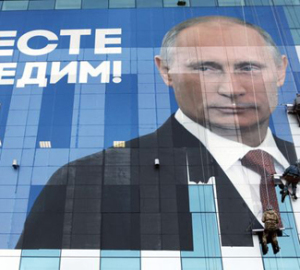LIVE TUESDAY CALL NO. 28
 Vladimir Putin’s “uncontested incursion” into the Crimea has provoked a political controversy in the West over how we should respond. What’s striking about the argument to me is that even the most hawkish of voices, including John McCain, Bill Kristol and Niall Ferguson have no stomach for countering Russia militarily.
Vladimir Putin’s “uncontested incursion” into the Crimea has provoked a political controversy in the West over how we should respond. What’s striking about the argument to me is that even the most hawkish of voices, including John McCain, Bill Kristol and Niall Ferguson have no stomach for countering Russia militarily.
On Morning Joe the other day, Bill Kristol bemoaned the fact that America saw itself as war weary, because that is a defeatist attitude that emboldens our enemies. His view exemplifies a theme of thinking in the traditionalist (amber) altitude of consciousness: force has be countered by greater force and whatever is not fiercely defended will be taken. And if you don’t think the enemy is at work, you’re not paying attention.
This perspective shows up again in the hawks’ critique of Obama’s foreign policy in general: Obama invites aggressive behavior because he is naive, weak and unwilling to use hard power. As conservative Charles Krauthammer wrote in his Washington Post column this week:
Obama says Putin is on the wrong side of history, and Secretary of State John Kerry says Putin’s is “really 19th-century behavior in the 21st century.”
This must mean that seeking national power, territory, dominion — the driving impulse of nations since Thucydides — is obsolete. As if a calendar change caused a revolution in human nature that transformed the international arena from a Hobbesian struggle for power into a gentleman’s club where violations of territorial integrity just don’t happen.
Well Charles, you better hope it has because Americans are deeply unwilling to do anything like go to war to change things.
The popular analysis says that since 9/11, with our forays into Iraq and Afghanistan now dragging into the eleventh year, with nearly 7,000 dead and over a trillion dollars spent, Americans have grown tired of war.
If this is true, and I think it is, it represents an historic lowering-of-the-bar for war weariness. We can’t diminish 6,800 dead as every loss of life is a tragedy for that person and his or her families, but in comparison Vietnam cost 60,000 American lives and World War II cost 400,000.
The country’s economic sacrifice — while significant — is also far less than for wars in the past. Over the past several years the military has consumed between 4-5% of America’s annual GDP; in 1945 during the height of WWII it consumed 38%. (Though I’m using US number to explain US attitudes, the relative cost of war has also dropped precipitously throughout the world).
So it’s not so much that Americans are war weary as that they are orange and green. As a nation we have achieved modern- and post-modern-informed consciousness, which sees that wars cost more than they’re worth, and the way forward as a people is not to dominate others but to trade, be friends, have fun!
Consciousness at orange (modern) and green (post-modern) altitudes of development is war weary by its very nature. Just as red consciousness ends cannibalism, amber consciousness ends human sacrifice and orange consciousness ends slavery, each stage of development gains moral ground by abandoning practices that simply become repellent. In countries with modern and post-modern (but not pre-modern) centers-of-gravity, military action is becoming less and less of an option, and only an option against pre-modern enemies.
Europe is further along than the US in cultural development, so much so that in the case of Ukraine they aren’t even sure how far they want to go with economic warfare such as sanctions on Russia. European economies are far more intertwined with Russia’s (development in the lower right quadrant). So it turns out that with economic conflict, as with military conflict, it’s harder these days to hurt the other guy without also hurting yourself.
What are we poor humans going to be left to fight with: mere insults?
… Of which there are many directed to Vladimir Putin, from these shores at least. The mainstream American media is united in its demonization of the Russian president. For instance we hear how Putin can’t be trusted.
I think from an integral standpoint we can look at trust a little bit differently. Think of someone in your own life. Perhaps you can’t trust them to do what they say, perhaps you can’t even trust them to mean what they say, but you can trust them to be who they are.

The Russian parliament has passed a new law that prohibits “gay propaganda”. This includes a ban on the rainbow. We think that the world looks much better with more rainbows.
And so we trust Putin to be Putin, a Russian nationalist who has his peoples’ interest, particularly ethnic Russians, deeply at heart and is trying to create a space in the world for them to thrive, exercise their influence and express their Russian-ness. In this way he is a standard issue amber leader, and we can never assume he’s not going to use military force.
Putin also has a strong red streak that has stifled opposition, creating a situation that is always dangerous in human affairs: the absence of dissent. Absolute power corrupts absolutely, and Putin presides over a network of corruption that has amassed fortunes in the hundreds of billions of dollars for himself and his comrades. I also fear that he is surrounded by yes-people which fosters over-confidence and aggression. In short, you don’t have to be a megalomaniac to do what Vladimir Putin is doing, but that doesn’t mean he isn’t one.
Fortunately, Putin is also orange enough (and sane enough) to want to lead Russia into some kind of mutually beneficial relationship with the West. But he doesn’t want Russia to be culturally and economically colonized by the West. He seeks to create an indigenous Russian modernity, and in that goal I think he has the support the majority of the Russian people.
As integralists we want to be creating the most complete picture of Vladimir Putin we can have (it’s our integral civic duty), and that starts by noticing the reflexive vilification of him in our culture – and perhaps ourselves.
REVISITING “HER”: WILL MACHINES EVER BECOME CONSCIOUS?
In the second half of the call we revisited the provocative hit movie “her”, in which a man, Theodore (played by Joaquin Phoenix) falls in love with his operating system, Samantha (voiced by Scarlett Johansson).
I got a lot of pushback on my original critique of the movie a couple weeks ago in which I make the case that machines will never be conscious. Turns out many of you aren’t so sure. Michael Zimmerman is one of my best sparring partners in this debate, so I invited him on this week’s call.
Bullseye quote from Michael:
“… it’s all about complexity. If you have a super complex brain like humans have you have a really rich interiority. So the supposition on the part of the artificial intelligence people whose work I read is that they’re trying to attain an analogous kind of complexity which is very difficult, perhaps impossible to get, but something somewhat analogous to humans. I don’t think we’re ever going to be able to create human beings except the old fashioned way. But why not the possibility that a non-carbon based complexity could become self-conscious?”
Listen and let us know what you think!

Need some help listening on your mobile device? Click here.
Podcast: Download
Subscribe: Google Podcasts | RSS





